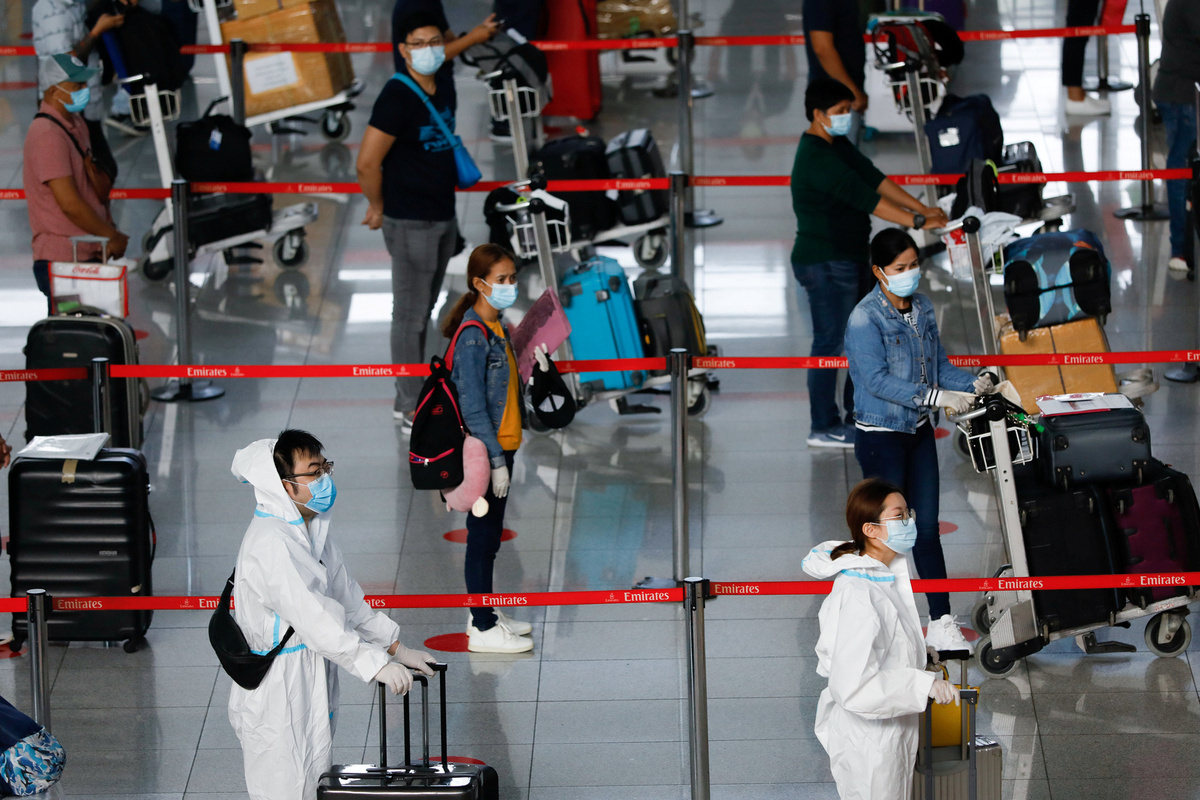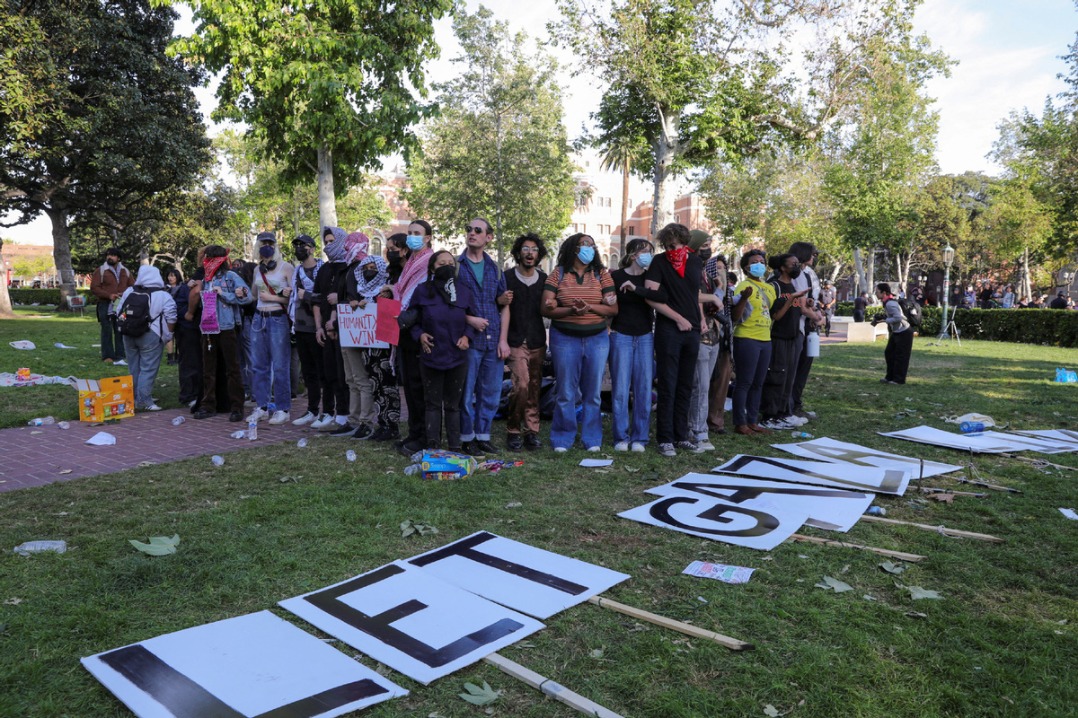Post-pandemic travel pokes its head through clouds
By KARL WILSON in Sydney | China Daily | Updated: 2020-09-17 08:17

Campaign launched
Airlines and aircraft manufacturers are already looking at ways to make air travel virus-free.
For example, Airbus has launched a campaign called "Travel with trust", with Jean-Brice Dumont, its executive vice-president for engineering, saying, "We are bringing you solutions for a safe and healthy journey so you can continue trusting in air travel, from the moment you consider boarding an aircraft to the minute you leave the airport."
Airbus said: "We are working to examine all aspects of the end-toend travel experience to ensure it continues to be healthy and safe. All of us-from airlines, pilots and crew, to members of the airport community-have a role to play when it comes to adopting health and safety routines throughout our respective air travel journeys.
"Whether it is on the way to or at the airport, behind the scenes at baggage, ground and cargo handling, or for cabin crew and pilots, we all need to play an active role, so we can commit to getting everyone back to the skies and maintain trust in air travel."
The manufacturer is examining the feasibility of using "fogging", also known as spraying or misting, to spray disinfectant on aircraft surfaces.
It is also looking at thermal treatment, where an aircraft cabin is heated between flights to a temperature much higher than the ambient level.
The company said it is "collaborating with the brightest minds in and outside of Airbus, harnessing forward-looking technical solutions to protect everyone traveling on board our aircraft to create a new and continuous travel experience."
For carriers, maintaining social distancing on aircraft, along with clean air and cleanliness, will be paramount.
The wearing of face masks aboard planes is still being debated by airlines.
Qantas, Australia's national carrier, has not made this compulsory. A representative for the airline said: "We are recommending that they be worn, but customers won't be forced to do so. However, if customers show symptoms in flight, they must wear a mask."
Some airlines will monitor passengers at departure gates, and anyone showing signs of fever will not be allowed to board.
Removing seats remains a costly option, and airlines are also looking at hand luggage.
Some German airports, including those in Munich and Frankfurt, are encouraging passengers to reduce the size of their hand luggage, creating a fast lane for those with only one small item. Meanwhile, the Indian government is considering a total ban on such luggage.
These factors mean rising costs for airlines and inevitably the traveling public.
Swinburne University's Thompson said: "It will be hard. I don't think anyone has got their head around it at the moment."
He said one highly likely post-COVID change is the introduction of vaccination cards like those issued some 40 years ago for diseases such as typhoid and yellow fever.
"These will probably be required by most governments around the world," Thompson said.
Li Xiang, director of the US-Asia Center for Tourism and Hospitality Research at Temple University in Philadelphia, US, said people are anxious to resume traveling after extended lockdowns, but they will be more cautious and will not come flooding back.
"I expect they will be more safety sensitive than price sensitive … at least for a while," he added.
Li expects the public to switch to what he terms a "lighter" way of traveling and vacationing.
"They will take shorter excursions closer to home and adopt a DIY style of travel such as private transportation, recreational vehicles and camping, or visiting friends and relatives," he said.
People will shun crowded destinations and attractions, preferring more-remote places and outdoor activities, he added.
Li said value, flexibility over bookings, and improved sanitation practices will help bring customers back.
"While lowering price is intuitively effective, offering value and adding service elements is a better solution," he said.
"We need to work closely with both the insurance industry and public health experts to raise cleanliness standards. We also need to do a better job communicating with guests to assure them of hygiene and safety," Li said.
Rajiv Biswas, Asia-Pacific chief economist with consultancy IHS Markit, said widespread international travel bans have resulted in the collapse of air travel between Asia-Pacific, or APAC, countries as well as on long-haul routes to other regions.
"However, as some countries have been able to control their COVID-19 case numbers, domestic air travel has begun to recover in some key APAC nations, including China and South Korea," he said.
Biswas said unlike the European Union, "which has substantially eased restrictions on domestic air travel within the EU", the Asia-Pacific region "has not yet lifted restrictions for international tourist air travel, as each country is continuing to maintain tight quarantine restrictions on movement of people."
The collapse of international passenger traffic, and the effect on carriers' balance sheets, have been devastating for Asia-Pacific airlines, with many seeking government bailouts or other forms of capital injection.
Virgin Australia has entered voluntary administration, with Bain Capital acquiring the airline, while Thai Airways is being restructured under the supervision of a bankruptcy court.
More Asia-Pacific airlines are expected to face financial crises in coming months as the protracted restrictions on international travel continue.
To avoid bankruptcy, many will require further government support or capital injections from the private sector through raising new debt financing or by selling equity stakes.
Airlines in countries such as China and Japan, which have relatively large domestic air travel markets, are in a comparatively better situation. Such travel in these countries has improved in recent months, providing some revenue flow.
In China, domestic air passenger volume in the first half of this year fell by about 50 percent year-on-year. However, this indicated a substantial rebound in activity, given the scale of the nationwide lockdown and travel restrictions imposed during February and March.
Biswas said that with no end in sight to pandemic-related international travel bans in the region, Asia-Pacific airlines have experienced "tremendous financial damage to their balance sheets".
"Hopes for a recovery in APAC air travel are increasingly being linked to the rollout of COVID-19 vaccines, with the timing of this still very uncertain," he said.
Therefore, near-term financial woes for airlines will continue to mount.
"In the medium term, if the pandemic fades away with the rollout of vaccines, then a gradual normalization of air travel could occur in step with mass vaccination programs," he said.
International air travel could recover sometime next year, assuming the vaccines are effective, he added.
"This would allow a return to the more-positive, medium-term growth outlook for Asian commercial aviation, driven by strong growth in tourism and business air travel, which had been occurring during the decade prior to the pandemic."
However, this is an optimistic view of the aviation sector, as the tourism industry across Asia-Pacific has been badly hit by lockdowns and travel bans, resulting in it collapsing in many places.
























